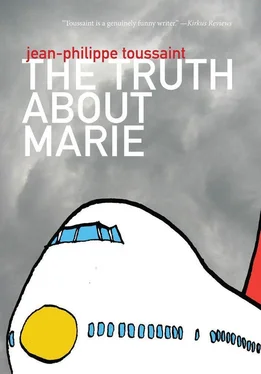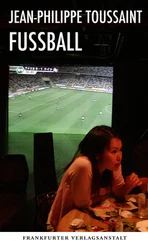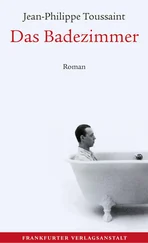The first defibrillation having failed, the doctor gave it another try at a stronger charge. After a moment of silence, with all eyes fixed on the monitor’s bright screen, the electrocardiogram’s straight line began to oscillate slightly, Jean-Christophe de G.’s heart started beating again. A paramedic added a dose of antiarryhthmic medicine to his IV, and he was given more morphine. His condition seemingly stabilized, the doctor decided to transport Jean-Christophe de G. to a hospital at once. He gave no order or instruction, and yet everyone knew just what to do, the paramedics rose and prepared to leave, they began picking up the tools strewn about the floor and returned them to their cases, with some of the men already taking kits and bags down to the ambulance. Marie observed this silent ballet, a series of precise centrifugal movements away from Jean-Christophe de G.’s unmoving body, left alone for the first time in the center of the room, hooked to an IV and a small oxygen pump resting on the hardwood floor. The paramedics returned from the ambulance with a stretcher, which they set up in the room, adjusting the poles and unfolding the legs, checking its structural stability and the tautness of its canvas before carefully lifting Jean-Christophe de G. onto it. They laid a blanket over his lap, strapped him to the stretcher, tightened the straps around his thighs, and carried him out of the room, a paramedic scurrying alongside the stretcher in the hallway with the IV and oxygen pump. The crew left the apartment quickly with Marie trailing barefoot on the landing, she tried to activate the automatic light but it wasn’t working, and she watched them go down the stairs in the dark. They proceeded slowly through the darkness of the stairwell, one step at a time, keeping the stretcher level and studying the angles and curves of their passage to avoid scraping the walls or hitting the banister. At the foot of the stairs, one paramedic broke from the group to open the door. They walked outside and vanished from Marie’s sight at the precise moment I got to the building, the sole onlooker adrift in the street at three o’clock in the morning.
At first I hadn’t understood a thing when Marie called me in the middle of the night. The rain fell heavily through the open window, the storm continued to rage, and I heard the phone ring in the darkness of the one-bedroom apartment where I’d been living for the last few months. As soon as I answered I recognized Marie’s voice, Marie who after calling an ambulance had called me — right before or right after, I’m not sure which, the two calls must have been made moments apart — Marie, upset, confused, bewildered, had called me for help, pleading with me to come quickly, without any explanation, come quick, she told me hurriedly, come right now, hurry, it’s an emergency, beseeching me, begging me to get to rue de la Vrillière at once.
Marie’s call — it was a little before two in the morning, this I’m sure of, I looked at the time when the phone rang — had been extremely brief, neither of us able nor really wanting to talk, Marie had simply called for help, and I was speechless, paralyzed by the fear of a late-night call, a feeling confirmed, exacerbated even, by the irrational and violent onrush of embarrassment, annoyance, and guilt I felt immediately upon hearing Marie’s voice. For, as I recognized Marie’s voice on the phone, my gaze was fixed on the body of a young woman sleeping next to me in my room, I was gazing at this body lying motionless in the half-light, she wore nothing but a tiny pair of baby-blue silk panties. I stared at her bare side, the curve of her hip. I was gazing at Marie confusedly (Marie, her name was also Marie), and, with a sense of shock and unease, I foresaw the confusion awaiting me in night’s final hours. Make no mistake, I had no trouble distinguishing between Marie and Marie — Marie wasn’t Marie — but I knew immediately that I was incapable of being two people at the same time, simultaneously the person I was for this Marie in my bed and that person I was for Marie — her lover (even if we’d stopped living together since I’d moved into this small one-bedroom on rue des Filles-Saint-Thomas after our trip to Japan).
It was two thirty in the morning when I left my small one-bedroom on rue des Filles-Saint-Thomas to go help Marie. Outside the sky was dark, black, immense, invisible, and an unbroken sheet of rain falling through the yellow light of the streetlamps blocked the horizon. I threw myself straight into the downpour, my jacket’s collar raised, and I started in the direction of the Place des Victoires, stooped under the rain, its heavy drops blurring my vision. The thunder rumbled in the distance, in regular intervals, and the rain spewed out of an insufficient number of sewage drains, as if boiling up from below, streaming down the street gutters with the impetuousness of small urban torrents, ravaging and heedless. I reached the Place de la Bourse, silent, abandoned, the staid columns of the Palais Brongniart shining in the night’s darkness. The esplanade was deserted, its surface pounded by an oblique curtain of rain and covered with a pool of splashing, windswept water. I could hardly see ahead of me, I didn’t know where I was going, I closed my jacket tightly around me in a futile attempt at self-protection. I kept turning the wrong way then would run back in the opposite direction, nearly losing my balance on the slippery sidewalks. Reflections from the streetlights shimmered here and there on the wet pavement, and from time to time I discerned through a sort of aqueous fog that the rain held over my eyes the ghostly headlights of a car passing in the distance, moving as if in slow motion, inching along, slogging through the water, its headlights piercing through the flood.
I was still running when the Place des Victoires came into sight, I saw suddenly in the horizon the connected façades of the private houses and the three-headed streetlamps lit in the beating rain, and, in the middle of the plaza, rearing, immense, the equestrian statue of Louis XIV, which looked as though it were fleeing the storm. My concern quickly turned into panic when I reached rue de la Vrillière and saw, in the night, police lights in front of Marie’s. I walked the last stretch on wobbly legs, soaked from head to foot, still moving forward, full of emotion, out of breath, my heart racing, but no longer running, walking slowly, graceless, as if holding back each step and yet advancing against my will, no longer wanting to go on, imagining the worst, an accident, a late-night assault, and, thinking then about Marie with worry and affection, I remembered that night when an alarm on rue de la Vrillière had startled us from our sleep. We didn’t get up immediately, certain it was just another car alarm set off for no reason in the middle of the night, bound to wake up the entire neighborhood before turning off just as mysteriously as it started, but this alarm was harsher, more disconcerting than the usual car alarm — I’d never heard one like this, as if it had been designed for unknown catastrophes, sounding in the night to warn inhabitants of some nuclear accident — and it only came to an end after forty minutes, during which Marie and I had time to get up and go over to the window, Marie struggling to stay awake, her cheeks hot, her eyelids heavy, dressed in one of those baggy and threadbare T-shirts she always wore to bed, I could smell the scent of her warm sleepy body standing beside me. Side by side at the window, we relished at length the complicit, tender intimacy of the moment, I’d put my arm around her waist and we stared in silence at the dark walls of the Banque de France, exchanging from time to time an amused look, observing what was going on without trying to make sense of it, all of this taking place in what seemed a suspended moment in time, dynamic and intense, a moment of pure nothing, an emptiness charged with an invisible energy ready to explode at any instant, a gap continually animated by little events, unrelated, trivial, small in scale, occurring at regular intervals so that right when we’d be ready to go back to bed the tension would flare up again and put us back on guard, the arrival of a police car in the night, for example, greeted by two or three security guards, who seemed to have cordoned off the bank, or, ten minutes later, the slow and partial opening of the bank’s heavy bronze gate, with nothing to follow, apart from a guard poking his head out briefly in the night, and nothing more before the heavy bronze gate was then closed, filling the street once again with a diffuse sense of imminent threat, rendered even more palpable by its very invisibility. I never did find out in the end what had actually happened, I leafed through the papers the following days but found no information regarding the incident, and of this night I’ve retained only the exquisitely sensual memory of my silent intimacy with Marie.
Читать дальше












